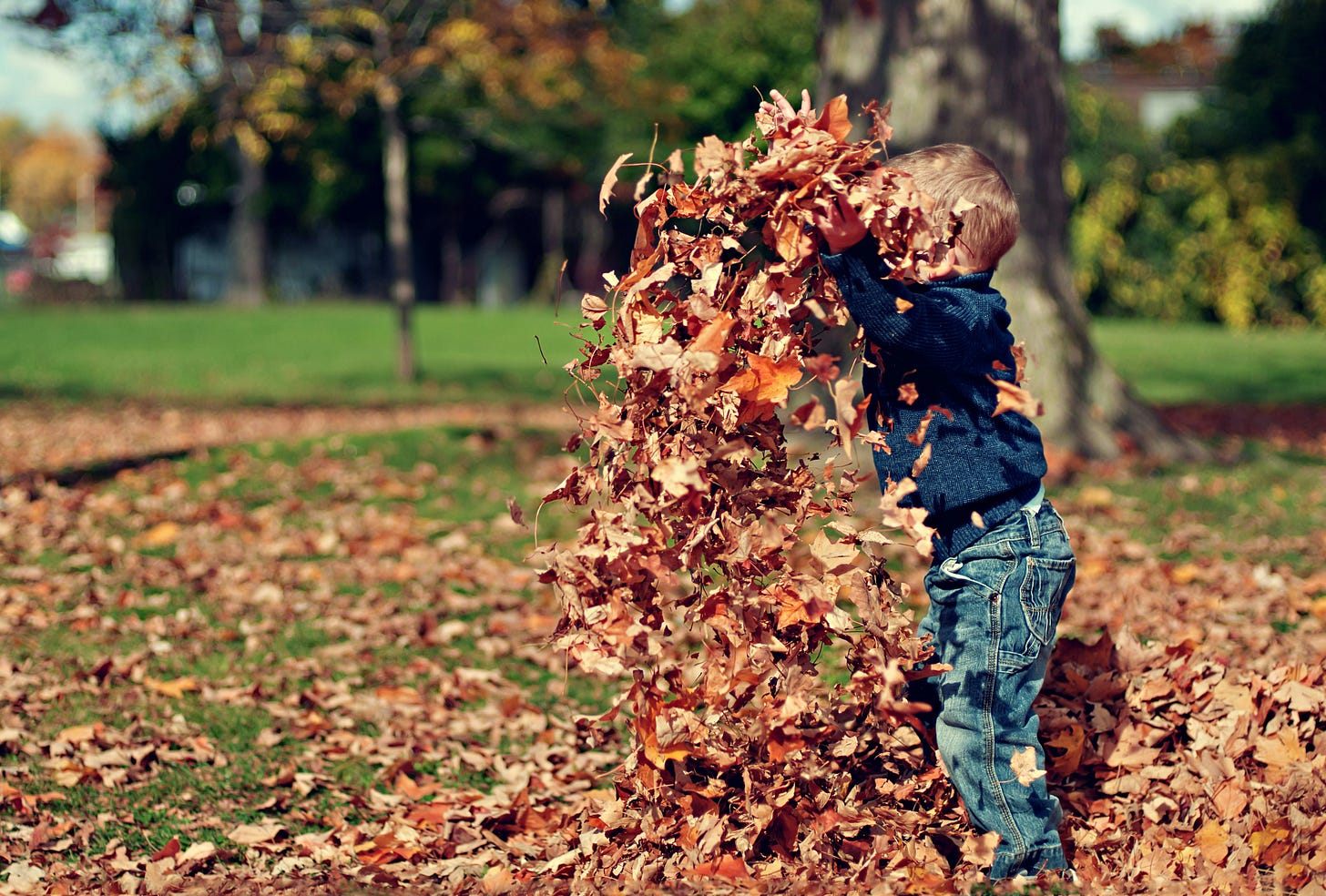My daughter made me laugh recently as she recounted her first experience taking our neighbour’s daughter to the park. “Mummy, you wouldn’t believe it. It took us about twenty minutes to walk down the street! She wanted to pick up every leaf and show me how big it was. She wanted to pat about four dogs, and climb up to walk on the walls. It took us ages!”
Yep, that’s little kids for you. With greedy curiosity, they want to experience everything through their bodies. Every leaf is a treasure, every step a new adventure. Their wonder at the world reminds us to slow down and be present.
In his book Awe, Daniel Keltner writes, “Wonder is the mental state of openness, questioning, curiosity, and embracing mystery, which arises out of experiences of awe.” But instead of letting children remind us how to savor these moments, we clip iPhones to their buggies and keep them in a state of constant distraction
.
The Instant-Everything Lifestyle
In a world where everything is at our fingertips, the concept of delayed gratification feels almost redundant. Need new eyelashes? Tap. Craving Pad Thai? Swipe. Want to distract yourself from impatience at the traffic lights? Scroll.
But what’s the real cost of this instant-everything lifestyle, especially for our kids? What are we losing when we trade small moments of waiting or boredom for the quick fix of a screen?
Why Does Delayed Gratification Matter?
The ability to wait for something we want, to sit with desire rather than giving in immediately, is a cornerstone of resilience and self-control. The famous Stanford study on delayed gratification showed that children who resisted eating a marshmallow for 15 minutes in exchange for a second marshmallow later, grew up to have better academic performance, healthier relationships, and greater emotional stability.
Impulse control is a vital skill for all of us, but it is learned. Without it kids can end up self-harming, binging on junk food, stealing, gambling, being violent and in addictive cycles of harm. And this can lead to living life with constant regret and the compounding mental health issues that come with that.
Smartphones, however, are the antithesis of waiting. They deliver constant dopamine hits: a new notification, a TikTok video, a WhatsApp message. This creates a world where the ability to wait, reflect, or process is no longer practiced or even needed.
Boredom: A Hidden Superpower
Boredom isn’t just a lull between activities; it’s a breeding ground for creativity, problem-solving, and emotional growth. When kids are bored, their minds wander. They invent games, make up stories, or explore their environment. But with a smartphone in hand, that boredom disappears—along with its benefits.
Author Monica C. Parker writes in Time magazine, “Rather than demonizing daydreaming, we should protect it, nurture it, honor it—if not for the raft of physiological and psychological benefits, then for the potential societal benefits. People who daydream are more reflective, have a deeper sense of compassion, and show more moral decision-making. And ultimately, children who are more reflective, compassionate, and moral grow up to be the adults who build a more just society.”
Mindfulness vs. Mindlessness
Mindfulness teaches us to be present, to observe our thoughts and emotions without judgment. Smartphones do the exact opposite. They encourage mindlessness: scrolling without purpose, consuming without reflection, reacting and judging quickly without stopping.
Consider the small but profound moments of life: waiting in a queue, riding in the car or sitting in silence. These used to be opportunities to reflect, connect, or simply be. Now, they’re filled with screens. For kids, this means growing up in a world where every emotion can be avoided with a swipe, every thought drowned out by a TikTok video.
The Smartphone Trap for Parents
We’re not immune, either. I’ll admit I’m guilty of thinking that micro-moment, like waiting for the kettle to boil or sitting in a waiting room, can be opportunities to be productive. Parents, how often have you turned to your phone at the slightest hint of boredom? But when we model this behaviour, our kids learn it too. They see us scrolling at the dinner table or buying something unnecessary with a single click.
We’ve normalised convenience and instant gratification at the cost of mindfulness, connection, and even financial common sense. And the deeper cost? A generation of kids who might never discover the power of waiting.
How Do We Reclaim Delayed Gratification?
Introduce Waiting Games: Challenge your kids (and yourself!) to wait. Set a small goal, like saving up for a toy rather than buying it immediately or make a list of things you need, stick it on the fridge and then do one online shop at the end of the month. Celebrate the wait—make it a family value.
Encourage Screen-Free Boredom: Let your kids sit with their boredom. Provide materials for creative play, but don’t rush to entertain them. Boredom is where brilliance begins.
Be Mindful Role Models: Demonstrate mindful behavior by putting your own phone down. Show your kids that it’s okay to sit in silence or let your mind wander.
Teach Emotional Resilience: Help kids recognise and name their emotions rather than distract themselves with screens. Talk about how it’s okay to feel frustrated, sad, or bored and that these feelings always pass.
Delay Smartphones: Agree with your friends and families to give your child an alternative device as their first phone and hold out as long as possible on a smartphone.
The Long-Term Gift of Delayed Gratification
When we teach our kids the value of waiting, we give them something far more valuable than a smartphone: the ability to sit with themselves, process their feelings, and engage with the world in a meaningful way.
It’s not easy to say no to instant gratification, but the rewards: a creative, resilient, and emotionally grounded child, are worth the effort.







love this, Hannah - very similar to my own blog going live today! (and I've shoe-horned a reference to yours within it!, thank you!)